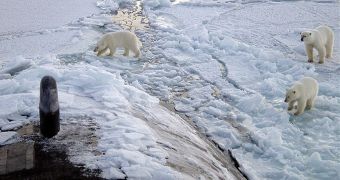BBC is currently accused of misleading the audience, encouraging its public to believe that a footage of a newly-born polar bear cub was filmed in the wild, when it was actually produced in an animal park from Germany.
Even though the creatures were not born in their natural habitat, born “beneath the snow” and the material also contains images of similar creatures filmed in the wild, the Telegraph informs.
BBC has been widely criticized by competition, stating its footage is misleading the audience, since only the people who visit the Frozen Planet website and watch a video made by the producer Kathryn Jeffs can notice that they are actually observing cute creatures raised in captivity.
Scenes from the new Frozen Planet series start with a polar bear filmed in its natural home, in Antarctica. Afterwards, the viewer can notice a cute polar bear family, a female bear and her tiny cubs. Instead of telling the truth, comments are far from clarifying the situation.
“On these slopes beneath the snow, new lives are beginning. The cubs are born blind and tiny,” says the voiceover.
In their defense, BBC says it has never used lies to attract a larger segment of viewers, since their script was “carefully worded.” On the other hand, John Whittingdale, chairman of the Commons culture, media and sport committee, tends to disagree, questioning BBC's actual fair play.
In Whittingdale's opinion, BBC should have been entirely open and honest about the footage, revealing the exact circumstances and explaining that the footage actually presents the birth of cubs sheltered by a German Zoo.
The disputed scenes were launched on November 23rd in a series that usually manages to capture the interest of approximately eight million viewers. There was definitely a lot at stake, but the misfortunate decision of wrapping the polar bear birth in ambiguity could affects BBC's reputation.
“If this was not filmed in the wild it would have been much better to have made that clear in the commentary. It’s questionable how many people would visit the website and find the video clip which explained the circumstances of the filming,” stated Whittingdale for the Daily Mirror.
Surprisingly, it is not the first time when a Sir David Attenborough documentary is under the spotlight not due to its educational value, but because of its deceiving content and message. A similar attempt of faking a polar bear birth was sanctioned by media and the public opinion, in 1997.

 14 DAY TRIAL //
14 DAY TRIAL //